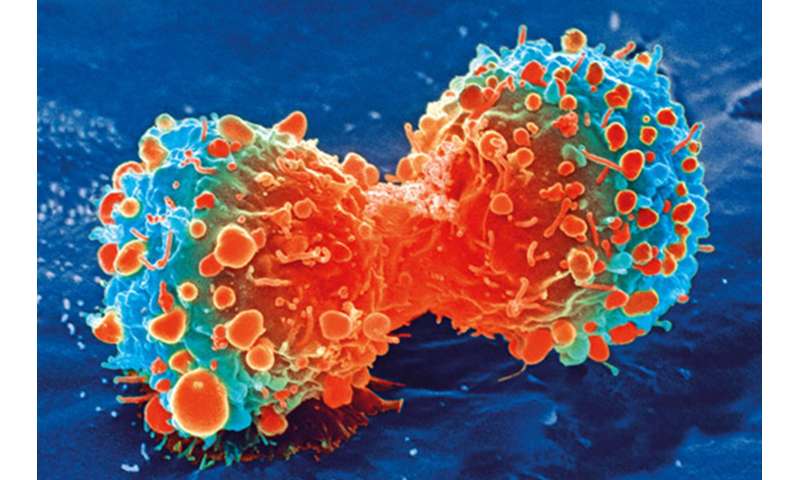
A blood test can help identify rare mutations in advanced breast cancer, which may enable patients to access effective treatments more quickly in the future, Cancer Research UK scientists have found.
As part of the plasmaMATCH clinical trial, funded by Stand Up To Cancer, a joint fundraising campaign from Cancer Research UK and Channel 4, the researchers were able to detect mutations in the DNA from the tumors, which had been shed into the bloodstream.
They found specific weaknesses in the breast cancer DNA that could be targeted with drugs, suggesting that this blood test could be a better way of guiding treatment than standard tissue biopsies, which can be painful and take longer to analyze. Their results were presented at the 2019 San Antonio Breast Cancer Symposium today (Thursday).
The team at The Institute of Cancer Research, London, and The Royal Marsden NHS Foundation Trust, analyzed the blood from around 1,000 women with breast cancer that had returned after treatment, or had spread to another part of the body.
They wanted to explore if taking a liquid biopsy, where traces of tumor DNA circulating in the blood can be detected, was a quicker and easier alternative to traditional tumor testing.
Breast cancer is the most common cancer in the UK, with around 55,200 new cases every year, and women who are diagnosed later, or whose cancer has come back after treatment have limited treatment options. For example, when the disease is diagnosed at the latest stage, only one in four (26 percent) people will survive their cancer for five years or more.
A small group of breast cancers that have acquired specific mutations, or genetic defects, may be directly targeted with new drugs that are currently undergoing testing in clinical trials. However, these defects are rare, so it’s important to identify the patients who could benefit most.
Currently, these defects are identified by taking out a piece of the tumor using a biopsy or during surgery, a process that is invasive and comparatively slower. These defects can also change after treatment or when cancer spreads, and in advanced cancer, it isn’t always possible to take further biopsies where cancer has spread. So, doctors may be working with an outdated picture.
This new study looked at whether a blood test could detect three targetable defects in genes called HER2, ESR1 and AKT1, which are known to drive breast cancer.
A total of 142 women with these detectable mutations were given experimental targeted therapies against the specific characteristics of their cancer. Those treatments that have shown initial promise will be tested further in larger clinical trials.
To validate their findings, the researchers also checked tissue samples from the patients and confirmed that the liquid biopsy had correctly identified the presence or absence of the mutations in over 95 percent of cases.
This suggests that the blood test could be a robust way of identifying rare subtypes of breast cancer and could replace the more invasive methods of analyzing breast tumors.
Professor Nicholas Turner, Professor of Molecular Oncology at The Institute of Cancer Research, London, and Consultant Medical Oncologist at The Royal Marsden, said: “The choice of targeted treatment we give to patients is usually based on the mutations found in the original breast tumor. But their cancer can have different mutations after it has moved to other parts of the body.
“We have now confirmed that blood tests can quickly give us a bigger picture of the mutations are present within multiple tumors throughout the body, getting the results back to patients accurately and faster than we could before. This is a huge step in terms of making decisions in the clinic, particularly for those women with advanced breast cancer who could quickly be put on new targeted treatments matched to their cancer if it evolves to become drug resistant.”
The researchers believe the blood tests are now reliable enough to be used routinely by doctors, once they have passed regulatory approval. And for the targeted drugs still in development, the next step is to carry out larger clinical trials to assess whether they are better than existing treatments.
Professor Carlos Caldas, senior group leader at the Cancer Research UK Cambridge Institute, said: “This work builds on increasing evidence in favor of liquid biopsies. It’s another step in the right direction and could mean a lot to people with advanced breast cancer, because it can identify those who may benefit from new targeted treatment after other options have stopped working.
“But liquid biopsies are also showing promise beyond guiding treatment choices. It’s relatively easy to take a blood sample, which means the test could be used to monitor how cancer responds throughout a course of treatment, or it may be able to detect the early signs of treatment resistance.”
Source: Read Full Article